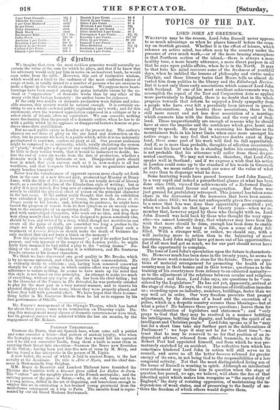ht Ightutrts.
his adversary would only pay him in notes on an insolvent bank, he would soon retire from the table. However, this sort of instinctive wisdom, which would set a limit to the rashness of the most confirmed adorer of rouge et noir, is totally denied to a number of persons who are anxious to make a figure in the world as dramatic authors. We suppose more heart- burnings have been caused among the genus irritabile vatum by the re- fusal or "suppression" of dramatic works than by any other of the many evils that besiege humanity : the author burns for judgment. If the only two results of dramatic production were failure and toler- able success, this anxiety would be natural enough. It is certainly ex- citing to see a whole crowded public applauding one's work ; and for this excitement, even the warmest approbation expressed in a critique or by a select circle of friends offers no equivalent. We can conceive nothing
more fascinating than the pursuit of a dramatic author, when he has to do with a public which by its applause or disapproval bestows honour or pro- duces immediate annihilation.
But no such public exists in London at the present day. The author's chances are not those of glory on the one hand and destruction on the other, but he presents his work to a public which, while it is too indolently goodnatured to condemn, confers no glory at all. Our present audiences might be compared to en university, which, totally abolishing the system of "pluck," would give a degree to any candidate, and grant no honours.
So little is their verdict worth, that it would be indiscreet to decide, be- fore the end of some six weeks from the date of production, whether a dramatic woik is really fortunate or not. Disappointed poets should bear in mind, that even success, such as it is, now-a-days is all but worthless, and that bouquets thrown tonight are no guarantee against empty benches tomorrow.
Never was the valuelessness of apparent success more clearly set forth than in the case of a new five-act play, produced last Monday at Drury Lane, with the title of Re Betrothal. It is not totally devoid of literary
merit, as a careful imitation of the Elizabethan style of writing; but as a play it is poor indeed, five long acts of commonplace being put together
merely to exhibit the physical effect of poison on the principal character in the last scene. If the author really thought that such an exhibition was calculated to produce grief or terror, there was the _Dame de St.
Tropez ready to his hands ; and, following its guidance, he might have traced the progress of venom from its first symptom as an uneasy sensa- tion to the catastrophe of an agonizing death. But four long acts, peo- pled with undeveloped characters, who woik out no idea, and drag their way along merely that a bad man, who designed to poison somebody else, should be torn and twistcd by a drug, which though not mortiferous can create all the pains of death, are somewhat too long a preface to the single act in which anything like interest is excited. Fancy such a treatment of hectic° Borgia as should make the death of Gennaro the only incident that did not leave a blank on the memory !
Now this play received "all the honours" ; and if its author had been. present, and was ignorant of the usages of the London public, he might fairly have imagined be had added a play to the "acting drama." No- thing of the sort. After Wednesday it is withdrawn, and Mr. Gustavus , Brooke returns to his former characters.
'We think we have discovered one good quality in Mr. Brooke, which is by no means universal, and which deserves high commendation. He is evidently docile to criticism ; and, having been censured somewhat sharply for a style of acting in which sudden effect was everything and adherence to nature nothing, he seems to have made up his mind that this style is not based on true principles. An attempt to make too much of everything, without any repose at all, has been his chief failing ; but in the character of the 17surer, in The Betrothal, he was perfectly satisfied to play for the most part in a very natural manner, and to reserve his physical displays for the last scene, where they were properly placed, and where they told with powerful effect. We have hopes that there is some- thing better in Mr. Gustavus Brooke than he led us to suppose by his first performance of Othello.


























 Previous page
Previous page